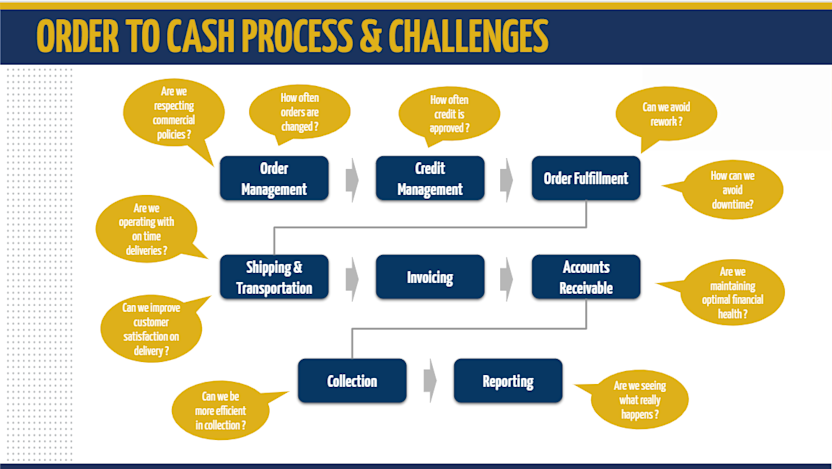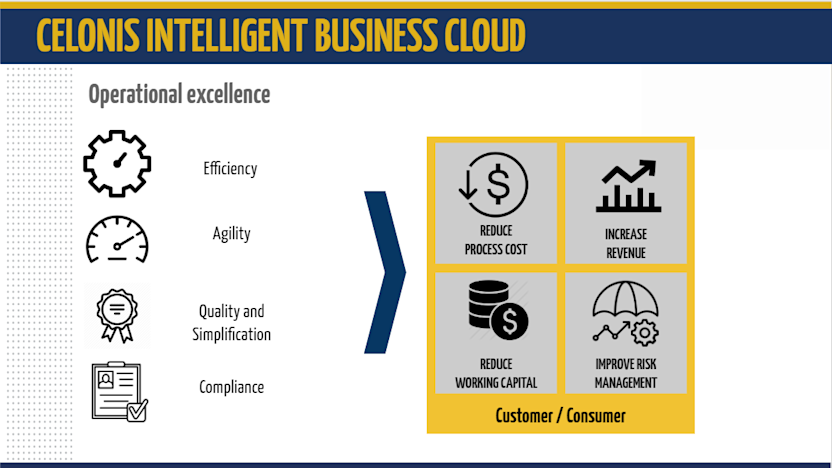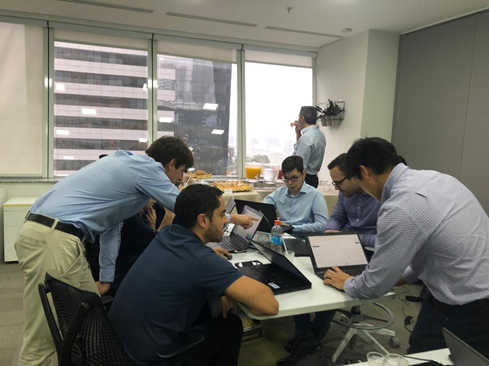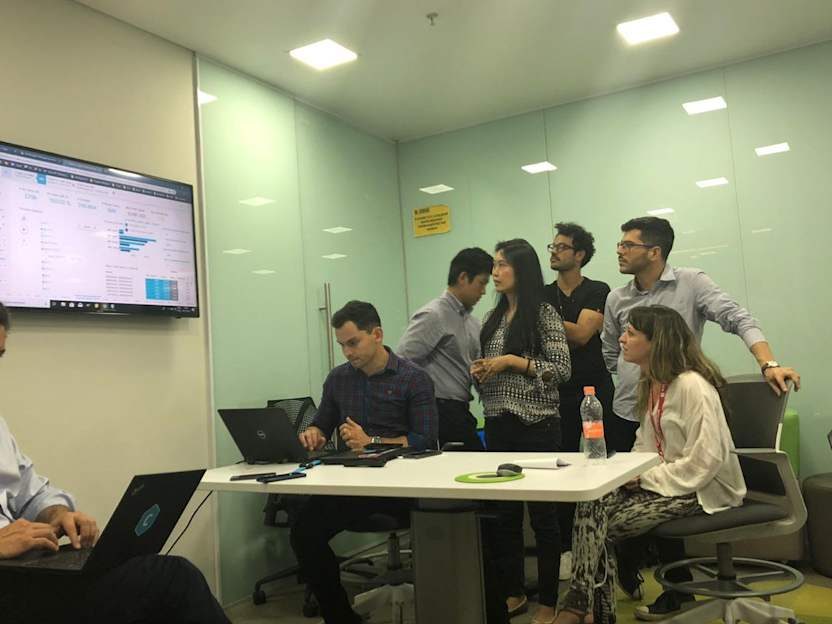
How Whirlpool Drove Change Management with a Celonis Hackathon
Whirlpool Corporation is the biggest home appliance company in the world, with $21B in annual revenue, 92,000 employees and 70 technology and manufacturing research centers globally. So when it comes to processes, we’re dealing with a whole lot of complexity, and seemingly never enough transparency to understand them all.
Whirlpool knows that a holistic overview of our processes and how they impact the objectives that drive our organization is key to our continued success. We invested in Celonis to help us identify inefficiencies and optimize our processes to close the gap between our strategic goals and how we execute our daily operations.
But finding the right technology was only the first step. If we wanted to be successful, we knew we needed to get our people on board to drive adoption and ultimately discover a new way of working.
Optimizing Order-to-Cash
We started by looking at the Order-to-Cash process with Process Mining. Our Order-To-Cash process is extremely complex — it has an infinite number of possible variants. We needed a tool that would help us understand them, and provide that transparency to all the different departments involved in the process, in order to successfully find opportunities to improve our execution and ensure audit compliance.
We prioritized the Order-to-Cash process because we knew it would glean the most tangible benefits — fast. We’d carried out an SAP implementation some time ago, and it had given rise to a number of questions around continuous improvement:
How often orders are changed?
How often is credit approved?
Can we avoid rework?
How can we avoid downtime?
Are we maintaining optimal financial health?
Can we be more efficient in our collections?
All these questions — and more — prompted us to review our processes in search of strategic improvement. There were several factors motivating the initiative: Talent continuously rotates to new positions through the organization, making knowledge transfer was tedious; our the systems are highly customized, making onboarding new joiners difficult; and most importantly, there was a strong desire to simplify our the processes so we could focus even more on the customer.

The reality is that processes are dynamic, and must be constantly adjusted to match the reality of the business. Today, eCommerce has taken on a very important role in our business for example, which was simply unthinkable before.
This forces us to be really forward-looking in how we identify and prioritize opportunities and inform our decision making — and how we leverage technology to do so.
Implementing Celonis
We implemented Celonis to collect time-stamped event log data from our SAP system and see how the work is actually done. Initially, this was done within our QA environment, so we could make sure that Celonis data extractions didn’t impact the performance of our SAP operations (it didn’t). After validation, we implemented it in our production environment and set it up to refresh the data daily. It was very simple — we got it working in no time and we were able to see exactly how our processes operate, a holistic view we simply didn’t have before.

Driving adoption with a hackathon
Technology alone isn’t the solution, however. For it to be truly successful, you need to drive adoption across the organization — only then can you be sure that your investment will pay off.
We had the Order-to-Cash process ready in Celonis, but we wanted to get the team comfortable and confident using the platform first. This is where the Hackathon came in. We brought together all the core business sectors related to the Order-to-Cash process: people from Global Information System; Finance; Commercial; Taxes; Credits; Audit; Sales and Supply Chain. A Celonis specialist was also on hand to lead the initial training, and offer support as the teams got going.
It was very different from our day-to-day. We even decided to hold the workshop offsite to help the team focus 100% on discovery. The main objective of the Hackathon was to have our interdisciplinary group of experts explore the tool and discover the first opportunities for process improvement for themselves.
Everything went as planned. The team was engaged and we were able to quickly learn how to navigate our processes and use the tool to analyze some of the friction points that our experts had already mapped.
We divided the team evenly into three groups, and each one analyzed their process area of expertise. Each group had representatives from different departments, as well as a Celonis specialist who was on hand to make sure we could take advantage of the platform’s full potential.

Identifying the most impactful inefficiencies — and how to fix them
It was a very productive day, and the teams discovered several opportunities for improvement that we’ve already started to implement — including over $650k in potential savings to be had simply by reducing manual rework, tackling late collections and cutting down on manual credit checks.
For example, Celonis helped us realize that nearly 20% of sales orders were being manually reworked every year — primarily due to quantity or item changes. By cutting down on those manual changes, we could simultaneously increase productivity, save tens of thousands of man hours, and hundreds of thousands of dollars.
Celonis also revealed that nearly 10% of Whirlpool's sales orders go through manual credit checks. Some of these were undoubtedly necessary — but not all. Eliminating just some of those checks could save us even more time, help us optimize working capital, while also improving on-time delivery and ultimately customer satisfaction.
Our groups explored both of these scenarios to quantify the impact and develop an action plan accordingly. They also identified that late collections were a big pain point for us. We’re very much considering Accounts Receivable as our next process for implementation, as we found that cracking down on late collections could have an impact of several hundred thousand dollars.

What's next for Whirlpool
The Hackathon helped our different stakeholders not only see the value of the platform, but learn how to use it themselves. The opportunities we discovered on the day were only the tip of the iceberg. We know there are many more, and now we know how to find them, and act on them.
To that end, we’ve also started a regular cadence of process improvement meetings, in which the multidisciplinary teams continue to get together every week to understand our processes, sense friction and take action to resolve it. The meetings are another step in institutionalizing the use of Celonis across the organization, and improving our business execution across the board.
We’ll continue to explore the opportunities within Order-to-Cash with Celonis, and mapping additional Whirlpool macroprocesses like Logistics, Accounts Receivable and others to have the complete picture. Celonis is certainly a fundamental tool in our digital transformation, and a hackathon is a great way to establish new, long-term ways of working.



